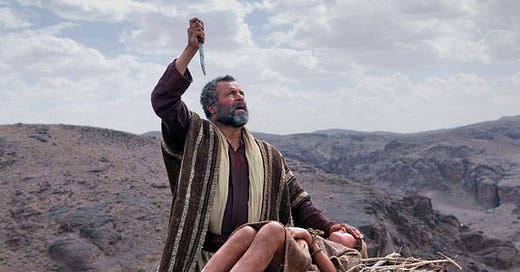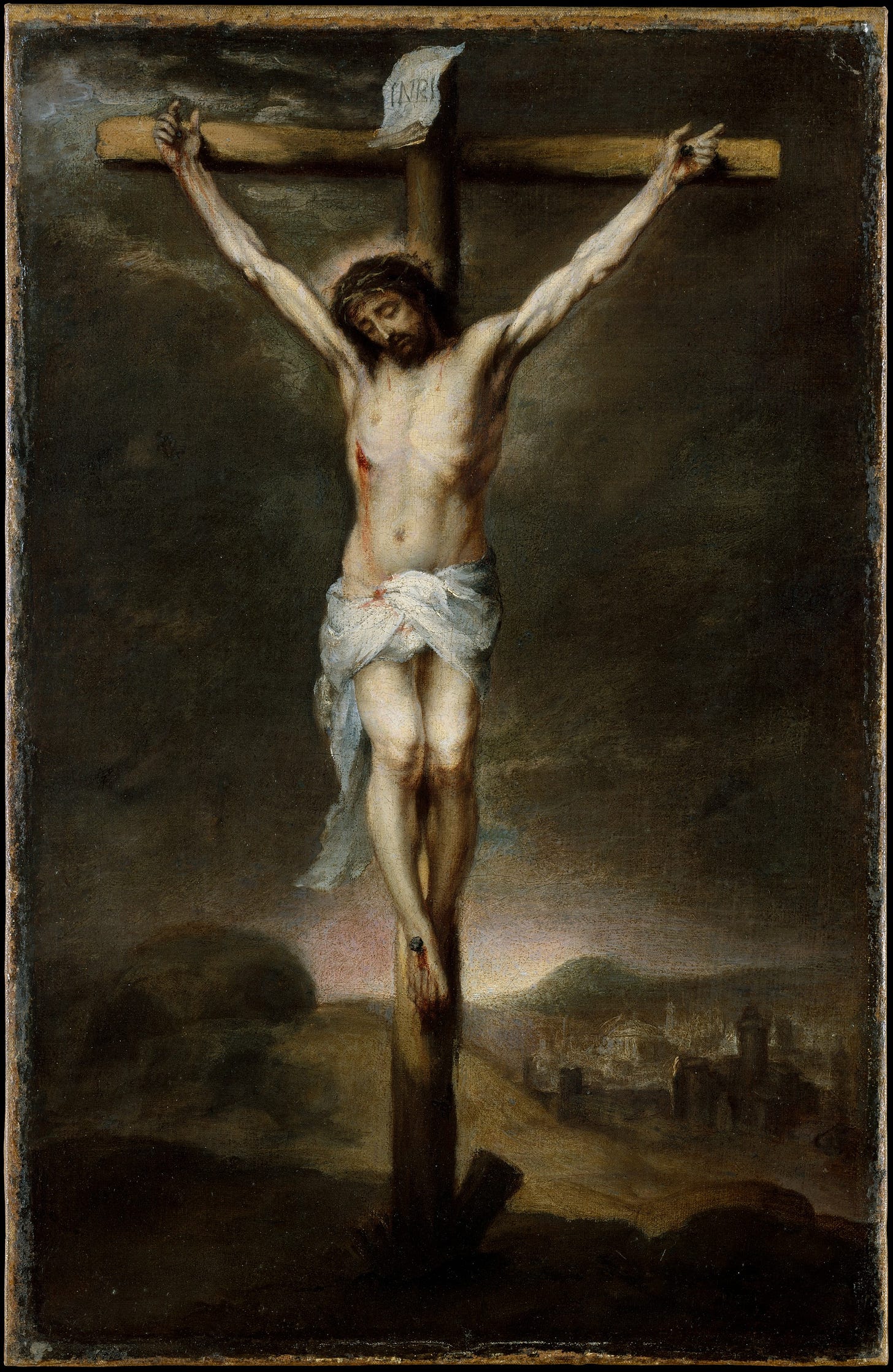The Binding of Isaac
In one of the strangest stories of the Old Testament, God speaks to Abraham and tells him, “Take your son, your only son Isaac, whom you love, and go to the land of Moriah, and offer him there as a burnt offering on one of the mountains of which I shall tell you.”1 Child sacrifice was not unheard of in those times — the Canaanites worshiped a god by the name of Moloch to whom they sacrificed their children — but this was not the God whom Abraham worshipped: the God who said to him “I will make you a great nation, and I will bless you and make your name great, so that you will be a blessing.”2 The God who said to him “Look toward heaven, and number the stars, if you are able to number them … so shall your offspring be.”3 It was this God who told Abraham to sacrifice his only son.
Now when God had first given Abraham the promise, he had no children and his wife Sarah was advanced in years, so taking matters into his own hands, Abraham took Hagar, his wife’s servant, as a second wife and she gave birth to Ishmael. But Ishmael was not the son of the promise and was not to have a part in Abraham’s inheritance. For God spoke to Abraham saying, “As for Ishmael … he shall father twelve princes, and I will make him into a great nation. But I will establish my covenant with Isaac, whom Sarah shall bear to you at this time next year.”4 So after Isaac’s birth, Abraham disinherited his son Ishmael and sent him off into the wilderness.5 Such was the result of Abraham’s lack of faith.
Yet when Abraham was a hundred years old and Sarah was ninety,6 Sarah conceived and gave birth to Isaac, the son of the promise, through whom all the world was to be blessed. But now God, the same God who led Abraham from the city of Ur to the land of Canaan, the same God who told Abraham he would be a father of many nations, the same God who miraculously gave Isaac to Abraham in his old age, the same God who told Abraham that through Isaac all the world was to be blessed, was commanding Abraham to sacrifice his son Isaac, his only son, whom he loved, as a burnt offering! How could he demand such a thing?!
Yet Abraham obeyed. Abraham traveled to the appointed place. He placed the wood on his son’s back to carry up the mountain. He set up the altar and bound his son upon it. He lifted the knife in his hand, and at that moment the angel of the Lord spoke to him saying, “Do not lay your hand on the boy or do anything to him, for now I know that you fear God, seeing you have not withheld your son, your only son, from me.”7 And the Lord showed Abraham a ram to sacrifice in Isaac’s stead.
As a result of his faithfulness the Lord spoke to Abraham saying “because you have done this and have not withheld your son, your only son, I will surely bless you, and I will surely multiply your offspring as the stars of heaven and as the sand that is on the seashore.”8 Because Abraham was willing to sacrifice Isaac, his only son, whom he loved, God multiplied the promise that was to be fulfilled through him.
What do we make of this strange story? Some have declared God’s testing of Abraham to be an act of unnecessary cruelty. One can only imagine the pain which Abraham must have felt. Why would a good God make such a brutish demand? We may be inclined to dismiss this story as a relic of a barbaric past — a past in which men believed in cruel gods who knew not love. Yet, to the contrary, this story has everything to do with love, and the test which Abraham underwent is one which every one of us must endure if we are to learn to love God fully.
The Nature of Love
In The Four Loves, C. S. Lewis explores the meaning and nature of the various kinds of human love and their relationship to the Divine love. The basic premise of the book is that all the human loves are a gift from God. However, because they appear to us high and noble, “every human love, at its height, has a tendency to claim for itself a divine authority”9 such that the voice of love may at times sound us like the voice of God. And if we are not careful “we may give our human loves the unconditional allegiance which we owe only to God. Then they become gods: then they become demons. Then they will destroy us, and also destroy themselves.”10
Lewis demonstrates this problem in chapter 11 of The Great Divorce. In this chapter, a grieving mother wishes to enter into heaven to see her dead son Michael, but she cannot enter because her love for Michael has become her god. The spirit with whom she speaks tells her “you’re treating God only as a means to Michael. But the whole thickening treatment consists in learning to want God for his own sake.”11 When she defends herself on the grounds that her motherly love is the holiest and noblest of sentiments, the spirit objects “no natural feelings are high or low, holy or unholy, in themselves. They are all holy when God’s hand is on the reign. They all go bad when they set up on their own and make themselves false gods.”12
How then are we to prevent our loves from becoming false gods? By submitting them to the True God. “There is but one good; that is God. Everything else is good when it looks to Him, and bad when it turns from Him.”13 When Abraham bound Isaac upon the altar, he submitted his love for Isaac to his love for God. In so doing, he gave up all earthly hope of fulfillment of the promise. For how could he be the father of many nations when he had disinherited one son and was about to sacrifice the other? But God did not let the promise go unfulfilled. He did not take Isaac away from Abraham, but because of his willingness to let Isaac go, God blessed Abraham even more. This is what it means to put love on the altar.
In this lesson lies a great spiritual truth. The Christian God is not a harsh ascetic who demands his followers abandon all earthly pleasure. He is not a God who delights in inflicting pain. Rather, he is a loving God who has gifted us with all the deepest pleasures of love. However, in order for us to enjoy these pleasures, in fact for us to love properly at all, we must first lay down our earthly loves before God. It is for this reason that Lewis said “Every natural love will rise again in this country, but none will rise again until it has been buried.”14 When God tested Abraham’s faith, he was not exploiting Abraham’s love for Isaac, but perfecting it. By contrast, the problem with the grieving mother was not that she loved her son too much, but that she loved him too little.
God’s Love for Us
Despite all this, it may still seem unfair that God would ask such a thing of us. But, “we do not have a high priest who is unable to sympathize with our weaknesses, but one who in every respect has been tempted as we are.”15 For when Abraham bound his son Isaac, his only son, whom he loved, he was acting out on a small scale the centerpiece of the divine drama which God was to perform on that same mountain two thousand years later.
For, according to the gospels, God the Father, sent Jesus Christ, his only Son, whom he loved, down to earth as a man “that whoever believes in him shall not perish but have eternal life.”16 And the divine Son, in obedience to the Father, “humbled himself by becoming obedient to the point of death, even death on a cross.”17 Just as Abraham willingly gave up his son for God, so God the Father willingly gave up his Son for us. And just as Isaac did not resist the will of his father Abraham, so Christ willingly gave of himself, suffering the most humiliating of deaths on the cross, so that all the world might be saved. And on the third day, Christ rose from the dead, sealing his victory over death and guaranteeing the hope of our future resurrection.
Thus God does not ask of us anything that he has not performed himself. And although he asks us to sacrifice our loves, he does so with the promise that they will rise again, perfected in glory. In the Great Divorce, there is a man who comes to the entrance of heaven with a lizard (representing lust) on his shoulder. For some time he hesitates, ashamed of his lust yet not willing to give it up. But at last he yields, allowing the angel who has met him to kill it. The lizard falls from his shoulder, writhing in pain, but instead of perishing, it rises again, transformed into a beautiful horse, upon which the man rides into heaven. So it will be with all the loves which we let go.
Do not cling like Michael’s mother to the illusion of false love. Do not be entrapped by the god-like voice of your own desires. If you wish to have joy, then let go of that to which you cling. Offer up your love to Christ. Let it perish and it will rise again imperishable. As Lewis says:
There are only two kinds of people in the end: those who say to God, “Thy will be done,” and those to whom God says, in the end, “Thy will be done.” All that are in Hell, choose it. Without that self-choice there could be no Hell. No soul that seriously and constantly desires joy will ever miss it. Those who seek find. To those who knock, it is opened.18
Love God first, and all else will follow.
Genesis 22:2
Gen 12:2
Gen 15:5
Gen 17:20-21
Gen 21:8-14
Gen 17:17
Gen 22:12
Gen 22:16-17
The Four Loves, p. 7
p. 10
The Great Divorce, p. 92
p. 94
p. 100
p. 99
Hebrews 4:15
John 3:16
Philippians 2:8
The Great Divorce, p. 71




